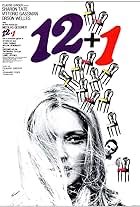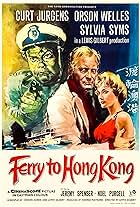..or La Fayette ,the French spelling.The first thing to bear in mind is that ,at the time,it was the biggest budget France had ever spent for a movie:hence the cast which includes Orson Welles as Franklin -a part he had already played in Sacha Guitry's "si Versailles m'était conté"-,Vittorio DeSica ,Jack Hawkins ,Edmund Purdom ,Liselotte Pulver;on the other hand,the French stars are not big names :Pascale Audret and Michel LeRoyer were far from being very famous compared with Bardot,Delon,Belmondo,Ventura or Moreau.Other assets were Claude Renoir's peerless cinematography and a lilting tuneful score .
But the harsh truth is that Dreville's epic is virtually forgotten in today's French collective memory:it has completely disappeared from dictionaries of films even the ones which feature the worst bombs though.And it's certainly unfair.Michel Dreville has never been an unrecognized genius as his earlier works testify:melodrama -the priceless weepie "la cage aux rossignols"-,biographies- "horizons sans fin" about female pilot Hélène Boucher-,Alexandre Dumas -the first version of "la reine Margot ,which ,despite of Jeanne Moreau ,is inferior to Chereau's remake with Isabelle Adjani.As for his comedies ("les sept péchés capitaux"," à pied ,à cheval ou en spoutnik" ),since we cannot say something nice.His best works are probably "copie conforme" ,thanks to Louis Jouvet, an actor so great any movie he makes cannot be bad,and this "Lafayette".
"Lafayette' is not really a biography for Lafayette's story is far from being over after his American adventure:he played a prominent part in the French revolution and even during the Restoration.Michel Le Royer is well cast as the lead:he has youth,panache and enthusiasm going for him and he's credible -it was a hard task because the marquis was barely twenty -:he embodies the end of the courtier,as Louis the Fourteenth wanted the noble to be:the scene with Monsieur ,the king's brother is revealing.Lafayette was ahead of his time, a visionary who had read the philosophers and who felt things were about to change:"now liberty has a home" he says ,on his way back to France.He could have added " and its home is not mine".
First part takes place in France ,after a short prologue which shows Brave New World's plight;the second one makes good use of the cinemascope for the battles scene.The dialogue is above average .Besides,the director displays respect for the audience :the American and English speak English -there are a lot of subtitles-,and the French French,which,at the time was not that much obvious.Even Lafayette tries his hand at English with a funny accent.And unlike "the patriot" ,in Dreville's movie,the English are not sadistic brutes and nasty executioners
Historians are going to say that,for instance, Marie -Antoinette and Lafayette ,were not as thick as thieves ,and that the queen called the New World hero "Monsieur Blondinet" (=fair-haired boy,meant pejoratively).These are minor quibbles."La fayette" is not a masterpiece,but it's pretty entertaining .






































